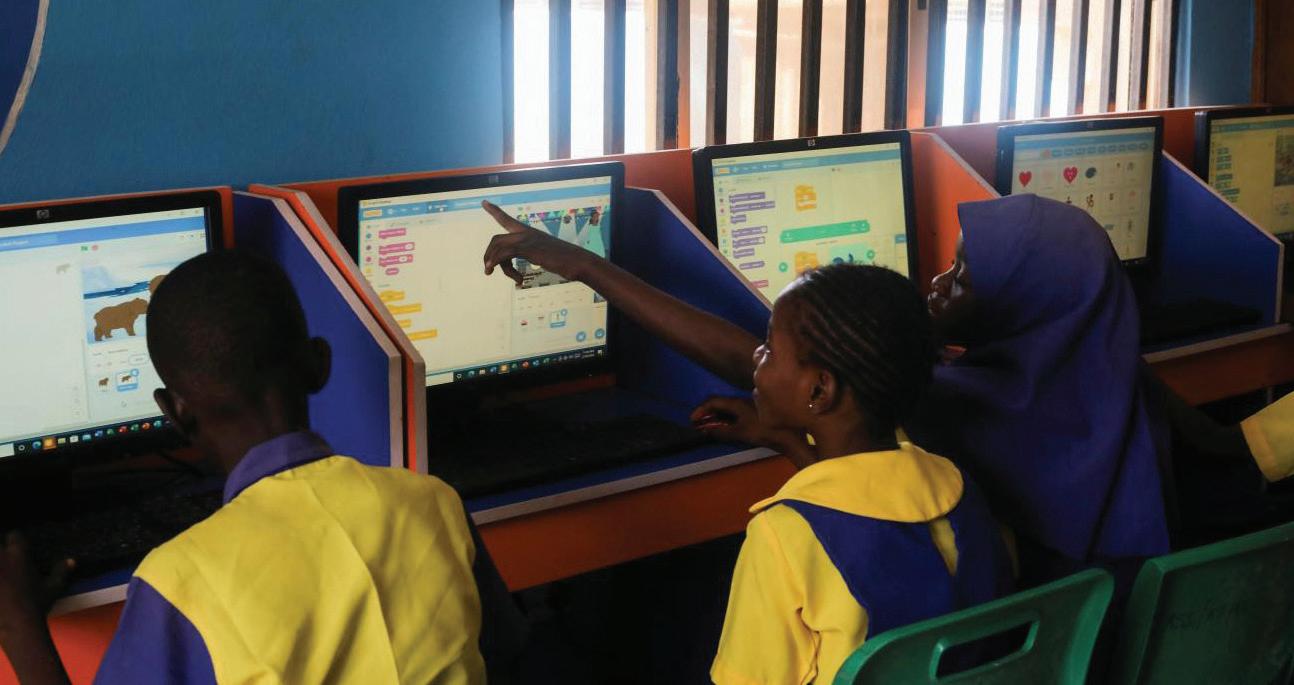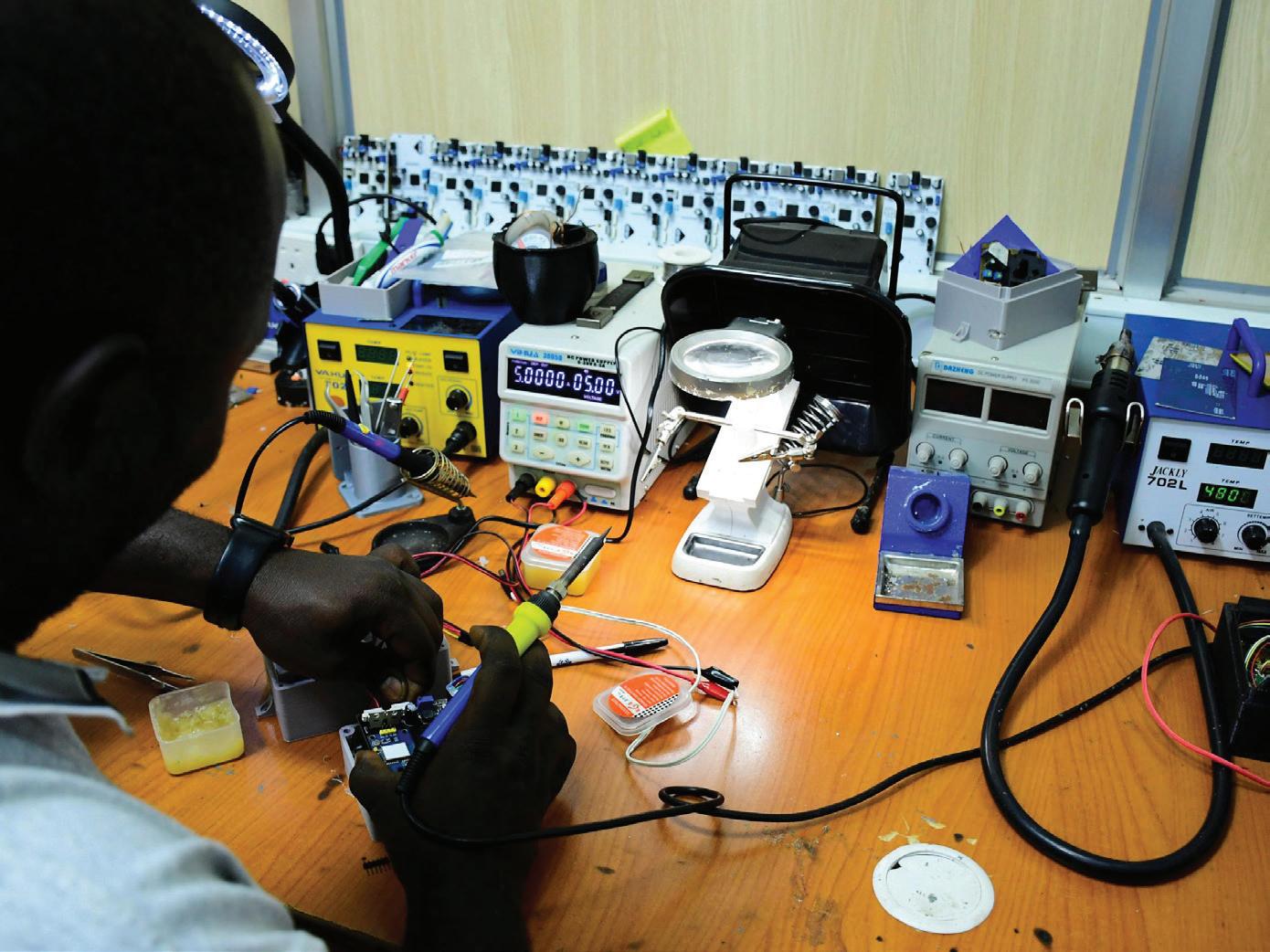
6 minute read
Using AI to decolonize healthcare in Africa
Entrepreneurs work on their projects at Nailab, a Kenyan firm that supports technology
How artificial intelligence can help empower communities to create their own solutions
/ Read original article here /
Inequities inherent to artificial intelligence (AI) could influence global health as the technology embeds deeper into industries writ large. An AI model for generating images, for example, struggled to create images of Black African doctors caring for sick white children. It struggled because these algorithms are trained using datasets that include social biases, including racial biases that were birthed by colonialism and remain prevalent in the field of global health.
Calls to "decolonize global health" have emphasized the unequal power dynamics between those most affected by the problems and those who dictate research priorities, set research standards, write papers, own data, and lead the field. More than 70% of global health leaders are nationals from high-income countries. Major global health funders such as the U.S. Agency for International Development (USAID) and Wellcome Trust award grants primarily to researchers and institutions in their own countries or other high-income countries. These global health inequities can be addressed through approaches that shift power and ownership to those most affected.

In Africa, a movement is rising to accomplish this feat using AI. Grassroot organizing has led to the creation of programs and communities focused on using AI to address problems in Africa. These solutions will succeed if led by Africans themselves, the true experts of their communities and problems.
Data Science Africa (DSA), a grassroot organization started by Africans for Africans, is doing just that. Launched in 2015 to develop capacity and local solutions to African problems using data science methods like machine learning and AI, DSA partners each year with researchers at a local university in a city in Africa to host a five-day event—a three-day summer school and a two-day workshop.
This event creates a space in which participants can share data science solutions while building relationships and a sense of community. DSA receives funding from companies and philanthropic programs such as Arm, DeepMind, Lacuna Fund, and AI4D Africa for its annual meeting and to provide research grants and fellowships to data science researchers in Africa. DSA also collaborates with similar initiatives such as Deep Learning Indaba, the annual meeting of the African machine learning and AI community.
DSA emphasizes many principles that the global health field could emulate, including community, collaboration, and the valuing of the expertise of Africans. AI and other data science solutions created by researchers in the DSA community for health-related issues have largely involved input and participation of members from the local community in an end-to-end data science process.
Here end-to-end means that the projects start and end with community involvement. For example, to improve education outcomes—a major determinant of health— researchers at the Nelson Mandela African Institution of Science and Technology in Tanzania created an end-to-end machine learning solution called BakiShule (Swahili to stay in school). BakiShule, which was deployed in secondary schools in the city of Arusha, aims to keep students in classrooms by using data collected on common causes of dropout. These trends inform teachers and parents when a student is at risk of quitting school. In addition to machine-learning specialists, individuals who are expected to use the tool—teachers, education officers, and parents—provided input on the tool's design and useability.
In another example, researchers at Makerere University in Uganda developed an end-to-end air quality management system called AirQo to address the problem of air pollution, a major environmental risk factor for health. The system, which launched in 2015, was first implemented in Kampala in 2018. Since 2022 it has also been implemented in eight African cities outside Uganda. According to the World Health Organization, air pollution was associated with 4.2 million premature deaths globally and 383,419 deaths across Africa in 2019.
To develop the air quality monitoring system, the researchers did not focus only on the technical aspects of data collection and data science methods, but also on a range of community activities. The AirQo team developed public-friendly platforms, including web and mobile applications, to share data with the public and policymakers. They also conducted community engagement sessions at schools and halls in the local languages to address specific causes of air pollution, such as motor vehicles.
One example involved the installation of air pollution monitors on motorcycle taxis (boda-bodas), so they could collect air quality data across a broader area of the city. The project also engaged with mechanics as ambassadors for improved air quality. The air quality monitors were designed to function well in typical African weather conditions. Through community engagement and input, these end-to-end systems address problems specific to the local community.
To be sure, AI will not resolve the problem of the unjust distribution of resources and power that are at the root of health inequalities in African countries. AI is only one set of tools, but if trained by the right experts with the right resources, it can provide solutions to problems that shape health. Engaging with communities to identify and find solutions to local problems increases the odds of communities supporting created solutions. Rather than recruiting communities to support set agendas and programs, this approach empowers communities to create their own solutions.
It is important, to my mind, to sustain efforts by organizations such as DSA for at least three reasons. First, DSA participants come from all over Africa to learn and return to their countries to create new communities and resolve local problems. Second, such organizations have developed social capital and community trust, which means that they can easily expand their impact. DSA's approach of partnering with local institutions to cohost its annual meetings also shows support and respect for the programs already in place in these cities rather than destabilizing or undermining them. Third, decolonizing global health requires that those who wield power, such as funders, ensure long-term investments in human capacity building.
Funders should invest in computational infrastructure housed in institutions in African countries. Otherwise, AI researchers and developers in these countries will always depend on corporations in other regions, such as North America and Europe.
The number of people who applied to attend the 2024 DSA annual meeting is one of the largest in its nine-year history. As more African youths gravitate toward AI solutions, now is the time to work with organizations that focus on advancing equitable solutions and shifting power to those most affected by health inequities. AI can be used to maintain the imbalance of power and voice that exist in global health, a characteristic of how the system has always existed, or to advance global health equity.
EDITOR'S NOTE:
This article is part of a series exploring the ways artificial intelligence is used to improve health outcomes across the globe. The rest of the series can be found here.











